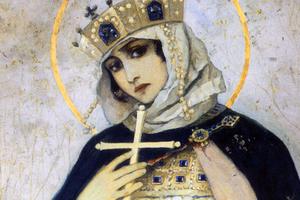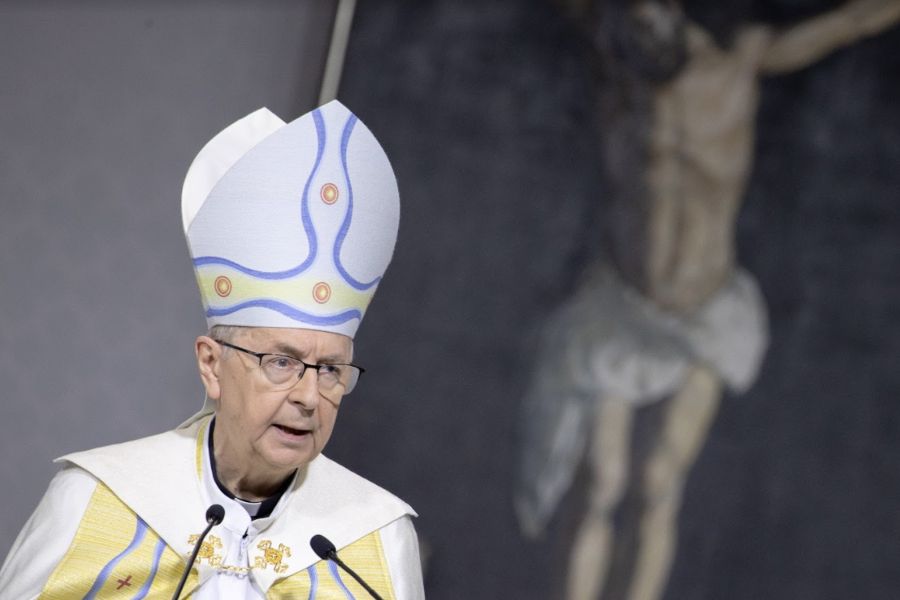St. Olga of Kyiv, Pray for Ukraine!
After a life seeking revenge against her enemies, Olga was baptized and became the patron saint of widows and converts.

I’d never heard of Olga of Kyiv until recently. She is not well-known in the Western world, but is celebrated more widely in the Eastern Orthodox and Eastern Catholic churches, where she is honored as a saint under the epithet “Equal to the Apostles.” But now, as the people of Ukraine struggle under the violent attacks of Russia, it seems appropriate to call upon the courageous saint for help.
Olga Before Her Conversion
Born to Viking parents in the East Slavic territory of Kyivan Rus’ around the turn of the 10th century, Olga was a young mother when her husband, Prince Igor of Kyiv, was captured and cruelly murdered by a neighboring tribe, the Drevlians. According to Byzantine Greek historian Leo the Deacon, Prince Igor’s killing was particularly gruesome: Two strong trees were pulled toward one another, and Igor was tied between them; then the trunks were released, causing them to swing back and wrench Igor’s body apart. Grand Duchess Olga was most likely still in her 20s, and the death of her husband left her alone to raise their 3-year-old son Sviatoslav.
The Drevlian leader, Prince Mal, was apparently emboldened by the capture and subsequent murder of Prince Igor. According to the Primary Chronicle, an 11th-century manuscript authored by Christian monks of Ukraine, the Drevlians sent a cadre of emissaries to Olga’s court, calling on her to marry Prince Mal and in that way to unite their two kingdoms.
Rather than summarily dismissing their request, Olga asked them to return the following day. “Your proposal is pleasing to me,” she said. “Indeed, my husband cannot rise again from the dead. But I desire to honor you tomorrow in the presence of my people. Return now to your boat, and remain there. ... I shall send for you on the morrow.”
But here, the story takes a sharp turn: While they were gone, Olga had a trench dug. When the Drevlians returned the following day, Olga instructed her people to lift the Drevlian delegation and their boat and carry them in parade. The men were surprised when instead of being honored, they and their boat were carried to the new trench, dumped into the earth, and buried alive.
Then before news of the executions could reach the Drevlian homeland, Olga sent for a second group of Drevlians. Upon their arrival, Olga commanded her people to draw a bath for them. Expecting a celebratory welcome, the Drevlian delegation entered the bathhouse, but then Olga ordered the doors bolted, and the building was set ablaze. All died in the fire.
Still seeking retribution for the death of her husband, Olga then went to the site of her husband’s execution, purportedly to hold a “funeral feast” in his honor. The Drevlians joined in the feast, and once they were drunk and incapacitated, Olga ordered her men to massacre them.
Finally, Olga found one more way to punish the Drevlians for their cruel murder. She ordered her soldiers to lay siege to the Drevlians’ encampment at Iskorosten, the modern-day Ukrainian city of Korosten, on the Uzh River. She extended an offer of peace, in exchange for which each household should surrender to her three pigeons and three sparrows from their household. Once she had the birds in her possession, Olga ordered her men to tie a cloth dipped in sulfuric acid to each of the birds’ legs. As evening approached, the birds flew back to their nests, and the sulfur set each household on fire simultaneously — burning the entire city. Anyone who fled the burning city was captured by Olga’s soldiers and was destroyed or taken into slavery.
Olga’s Conversion to the Christian Faith
The Primary Chronicle goes on to describe Olga’s eventual conversion to Christianity in the 950’s, and her baptism in Constantinople by the Byzantine emperor, Constantine VII. The Patriarch of Constantinople, according to the Primary Chronicle,
instructed her in the faith. ... He taught her the doctrine of the Church, and instructed her in prayer and fasting, in almsgiving and in the maintenance of chastity. She bowed her head, and like a sponge absorbing water, she eagerly drank in his teachings.
Olga took the baptismal name of Helena, after the ancient Empress, mother of Constantine the Great. Upon her return to Kyiv, she tried unsuccessfully to convert her son Sviatoslav to the faith; but he rejected her, fearing that he would be mocked by his countrymen in the pagan society. Sviatoslav did agree, though, that he would not persecute Christians in his kingdom. Although Olga was not successful in converting her country to the Christian faith, she erected churches in Kyiv and other Ukrainian cities.
Although Olga was not successful in converting her land to Christianity, her grandson Volodymyr (Vladimir) the Great embraced the faith and officially adopted Christianity in 988. It was Vladimir who expanded the kingdom into what is now seen as the first Russian principality (which Vladimir Putin considers to be the forerunner of the imperial Russian state).
St. Olga is venerated along with St. Michael the Archangel, patron of modern-day Kyiv. For the people of Ukraine, suffering under the Russian onslaught, St. Olga remains a model of patriotism and firm resolve.
- Keywords:
- St. Olga of Kiev
- Ukraine

















